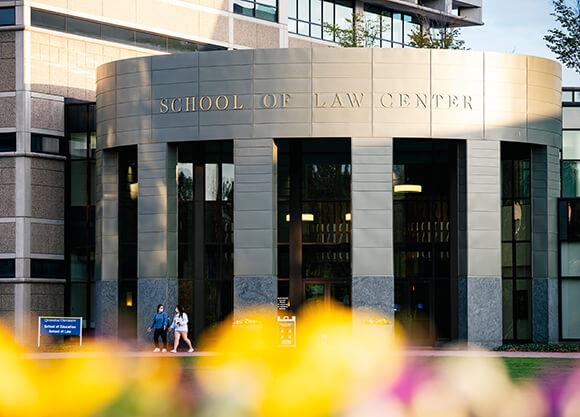
School of Law panel on extent of child marriage crisis in Connecticut, U.S.
April 24, 2021

April 24, 2021

Anti-trafficking advocates include “forced marriage” as a form of human trafficking. The International Labour Organization estimates that over 15 million people worldwide find themselves in forced marriages. Child marriage—which overwhelmingly involves girls—is a subset of forced marriage associated with the greatest risk for abuse.
The discussion, “The Movement to End Child Marriage: Where Does Connecticut Stand?” was part of the Connecticut Bar Foundation, Connecticut Bar Association’s Committee on Human Trafficking and Quinnipiac’s Human Trafficking Prevention Project series, “Understanding Human Trafficking.”
Between 2000 and 2015, over 200,000 minors were married in the U.S. Starting in 2018, four states have enacted total bans on child marriage, notwithstanding opposition from those who have argued that such bans represent an unwarranted intrusion on the fundamental right to marry. In 2017, Connecticut enacted a partial ban, allowing minors between the ages of 16 and 18 to marry with judicial approval based on a petition by a parent or guardian. Proposals to enact a complete ban on child marriage in Connecticut have thus far failed.
The panel, moderated by Quinnipiac School of Law adjunct professor Sharon Dornfeld, included Kate Ryan Brewer, director and writer of the documentary, “Knots: A Forced Marriage Story,” Fraidy Reiss, founder and executive director of Unchained at Last, Judge Beverly Streit-Kefalas, probate court administrator of Connecticut Probate Courts, and Nicholas Syrett, a historian and author of “American Child Bride: A History of Minors and Marriage in the United States.”
“One of the central questions we were trying to address in this panel is to what extent do all marriages involving individuals who are younger than 18 involve force, fraud or coercion and thus involve forced marriage,” said Sheila Hayre, visiting associate professor of law and the Waring and Carmen Partridge Faculty Fellow at Quinnipiac.
Reiss was 19 when her family arranged for her to marry a man who turned out to be violent. Through perseverance, she managed to get divorced, win full custody of her two daughters and get a final restraining order against her ex-husband.
Reiss is recognized internationally as an expert on forced and child marriage in the U.S.
“I’m so grateful to everyone who has been willing to listen to what I’ve been shouting about for several years now: The legislature really needs to take action here,” Reiss said. “The simple, obvious solution here is to end all marriage before 18 without exception. Legislation to that effect harms no one, it costs nothing, and it ends a human right issue.”
Hayre said the discussion was eye-opening.
“We initially approached the question of underage marriage convinced that Connecticut’s marriage laws properly balanced the fundamental right to marry with the need to safeguard against risks associated with child marriage,” she said. “After hearing from each of the panelists, I have come to question whether additional safeguards are indeed needed to more fully protect vulnerable minors aged 16 and 17 whose parents are petitioning for them to marry.”
The “Understanding Human Trafficking” series explores the interactions between trafficking victims and the legal system—starting with the criminal justice system—and delves into ongoing debates at the state and federal level about what reforms are needed to assist victims in escaping trafficking, in rebuilding their lives after they have escaped, and in preventing trafficking in the first instance.
Quinnipiac Today is your source for what's happening throughout #BobcatNation. Sign up for our weekly email newsletter to be among the first to know about news, events and members of our Bobcat family who are making a positive difference in our world.
Sign Up Now